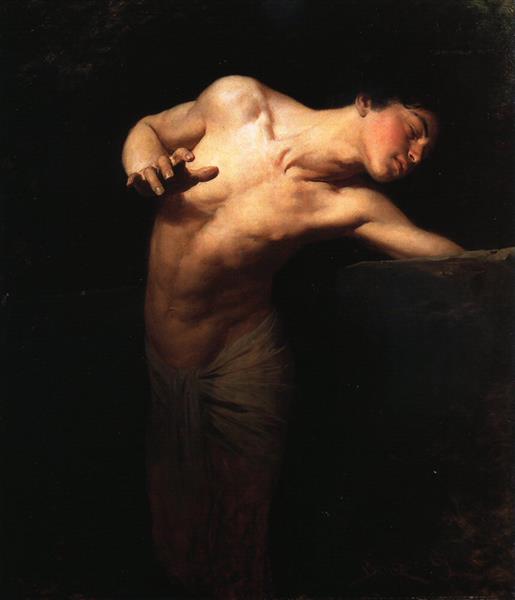Description
In the nineteenth -century European painting panorama, Gyula Benzúr stands out as one of the most representative artists of Hungarian academicism. His technical domain and his ability to capture the essence of classical and mythological themes are evident in his work "Narciso," created in 1881. Painting, like many of his other creations, reflects the virtuosism of Benczúr both in composition and composition both in execution.
"Narcissus," inspired by the Greek myth of the young man known for his dazzling beauty and funeral destiny, shows a deeply sensitive and nuanced interpretation of the classic theme. In painting, the young Narcissus is represented as an handsome man, with dark and wavy hair, kneeling next to a quiet body of water. The work captures the moment in which Narcissus, bewitched by its own image reflected in the water, is inclined towards the pond with an expression of fascination and dream on his face. This image evokes the central theme of myth: self -love taken to its tragic cusp.
The composition of the painting is remarkably balanced. Narcissus's reflection in water is not a mere echo of his figure, but a crucial element that doubles and at the same time contrasses reality with the illusion. Benczúr masterfully uses the play of lights and shadows to create an enveloping atmosphere. The surrounding vegetation, with deep green and brown green tones, frames Narciso and places the scene in a natural environment, which in turn contrasts with the light skin and the vaporous clothing of the character, highlighting it even more.
The color palette used by Benzúr is rich and harmonious. The autumnal tones suggest a decline station, parallel to the fate of Narciso, whose self -love finally consumes it. The texture of the water, achieved with subtle brushstrokes that capture transparency and reflection, is particularly remarkable. The detail in the leaves and the surrounding landscape demonstrates the meticulous eye of the artist for reality, while imbueing the scene with a sense of romantic idealism.
Gyula Benzúr, formed in the academies of Munich and under the influence of his masters, He mixed academic rigor with a romantic sensitivity that allowed him to address historical and mythological issues with significant freshness and emotional depth. "Narcissus" is not just a representation of the Greek myth; It is a meditation on the nature of man and his relationship with the image itself, a universal theme that resonates beyond its mythological context.
When considering "narcissus" within the corpus of Benzúr's work, it highlights its ability to handle both human form and natural elements, integrating them into a coherent and emotional visual narrative. This talent, together with the intense academic formation of Benzúr, solidifies its place as a pillar in the transition of European art of the nineteenth century towards a more personal and psychological expression.
In this sense, "Narcissus" by Gyula Benzúr is not only an consummated work of art in technical terms, but also a deep psychological and philosophical comment, which invites the viewer to reflect on the beauty, obsession and the ephemeral nature of existence of existence human
KUADROS ©, a famous paint on your wall.
Hand-made oil painting reproductions, with the quality of professional artists and the distinctive seal of KUADROS ©.
Art reproduction service with satisfaction guarantee. If you are not completely satisfied with the replica of your painting, we refund your money 100%.

